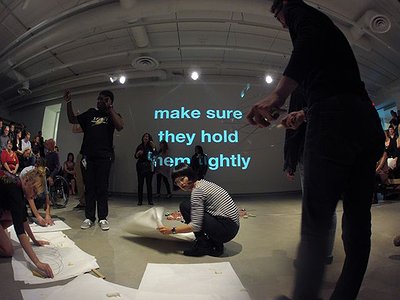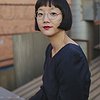In how much, do you feel, are creative decisions shaped by cultural differences – and in how much, vice versa, is the perception of sound influenced by cultural differences?
So much in both ways that sometimes you cannot distinguish that yourself.
The relationship between music and other forms of art – painting, video art and cinema most importantly - has become increasingly important. How do you see this relationship yourself and in how far, do you feel, does music relate to other senses than hearing alone?
Seeing music is equally as important as hearing. There are a lot of dimensions to listening that overlap other senses.
There seem to be two fundamental tendencies in music today: On the one hand, a move towards complete virtualisation, where tracks and albums are merely released as digital files. And, on the other, an even closer union between music, artwork, packaging and physical presentation. Where do you stand between these poles?
Having a closer union between music, artwork, packaging, and physical presentation makes a huge difference and you somehow become a brand… which is iffy, unless it’s part of your practice like branding as a form of performance. I think only time will tell.
The role of an artist is always subject to change. What's your view on the (e.g. political/social/creative) tasks of artists today and how do you try to meet these goals in your work?
I’m not really concerned about my role because it’s already highly interdisciplinary. Right now, I’m trying to keep my art real and fun for myself, unlike my old painting days.
Music-sharing sites and -blogs as well as a flood of releases in general are presenting both listeners and artists with challenging questions. What's your view on the value of music today? In what way does the abundance of music change our perception of it?
At the moment, I only care about what I make.
How, would you say, could non-mainstream forms of music reach wider audiences?
I think it is already happening. But I’ve only begun learning about all the different bands and musicians, and I like that I am completely unbiased towards music. Speaking of my non-traditional work, it seems to attract a wide variety of audiences: experimental musicians, visual artists, sound engineers, young creatives, people with disabilities, deaf people, philosophers, composers, inventors, and more. I’m at a point where I’m trying to find the balance in all those audiences rather than letting a certain audience pigeonhole my work. I’d like to keep my work open-ended and hopefully it will continue resonating with many of those audiences.
Usually, it is considered that it is the job of the artist to win over an audience. But listening is also an active, rather than just a passive process. How do you see the role of the listener in the musical communication process?
I often perceive art as a dialogue with audiences, so I find that it’s important to be able to communicate with listeners. However, doing sound pieces on my own terms, away from what people generally define as music/sound, I am aware that the role of the listener can get rather complicated. Oftentimes, I don’t factor it in my process and it becomes a big part of my practice. For example, I sent a different voice to each piano wire that was held up by participants. There were 10 wires in total and several times I was told that “they all sounded and felt the same” and was encouraged to differentiate them. But the thing is that my relationship with sound is actually monotonous most of the time. Resisting their expectations has affected me to factor the listener out of my process.
Reaching audiences usually involves reaching out to the press and possibly working with a PR company. What's your perspective on the promo system? In which way do music journalism and PR companies change the way music is perceived by the public?
With all those social networks like Facebook and Twitter, I think you have far more control in terms of PR. The audiences can easily contact you directly via email or twitter.
Please recommend two artists to our readers which you feel deserve their attention.
Melissa Dubbin and Aaron S. Davidson, an artist duo. I often find their pieces to be clever, transparent, and sometimes witty in many aspects.
Arone Dyer and Aron Sanchez, a duo band called “Buke and Gase.” They make their own musical instruments and everything about them is so loveable.
Explore the work of Christin Sun Kim at her website christinesunkim.com



